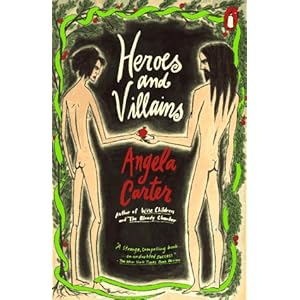Science-Fiction and Fantasy books. What we read and why we love the genre.
May 4, 2011
Angela Carter: Heroes and Villains (1970)
After a nuclear war, there are three surviving societies: the Professors, an elite group of survivors who form scattered enclaves of civilization sustained by farming; the Barbarians, nomads who have survived outside the bunkers, raiding the Professors' villages for supplies and food; and the Out People, mutants who have been mutilated by the radiation, inhabiting the ruins. The protagonist, Marianne, is a Professor's daughter. As a child, she witnesses an attack on her village during which a young Barbarian kills her brother. She grows more and more bored with life among the Professors, so at the age of sixteen, following her father's death, she willingly helps a Barbarian warrior during another attack and runs away with him to his tribe. After her attempted escape and rape by her dark companion Jewel, she is forced to marry him and discovers that he is the one who murdered her brother. Their relationship is ambiguous--erotic and antagonistic--but eventually, when Marianne gets pregnant, she allies herself with Jewel to overthrow the power of Donally, the renegade Professor and the tribe's shaman as well as Jewel's tutor, who introduced the Barbarians to the power of myth and ritual. When Jewel is killed in an ambush, Marianne decides to become a new leader of the Barbarians, a Tiger Lady determined to "rule them with a rod of iron" (This synopsis and a deep and philosophical analysis that I can't fully understand, you can find in Highbeam)
I personally don't find this post apocalyptic world convincing, perhaps the book has not aged well. I didn't like it, I find it simple, needlessly brutal and Manichean, and won't spend more time with it.
Please, if you liked it, tell me why because I admit that sometimes I'm unfair to certain books that I've read at the wrong time in my life, and knowing they are worthwile, I can retake them in another time and be able then to acknowledge the merit and grace in them.
Etiquetas:
Author - Angel Carter,
Sci-Fi - Post-Apocalyptic
Subscribe to:
Post Comments (Atom)


Can't help there, hon, we did not like it either. I didn't even finish it, went back to the library the day after I started to read it. Nina finished it because u know how she is thorough & disciplined & everything, but while reading it, she was making faces if u know what I mean.
ReplyDeleteHi! Been away a few days and... see what I find! Boring chick literature, girlish and prudish, although full of rape. I think I'll go for a walk around the rest of the post I've missed these days and see if I find something a bit more of my taste so we can discuss a bit. Kisses, Ron, welcome, I hope your return has been "slight".
ReplyDeleteI have to disagree with you, though I respect your opinions. I found that this book tapped into an internal conflict in myself, and also to a wider extent humanity in general. Like Marianne we can become trapped in our own regular routines and the only way to break out of them is to do something drastic, like Marianne's escape with Jewel. Also we all have to survive so we do ally ourselves with people, not always by choice but because they are the only people there, for example if she hadn't married Jewel, and through that act made part of the tribe, Marianne would have remained an outsider and wouldn't have survived. As for Donnaly and his overthrow, I think it shows how people are able to throw off influences that have taken over and become independant. Donnaly refuses to relinquish his hold on the tribe and so is cast out by Jewel. Overall I think this book is one about community and what people will do to try and find their place in the world.
ReplyDeleteI read the last line about 45 minutes ago; still trying to figure out what's going on beneath the surface of the novel. Length doesn't make it any easier. At times, action feels too sudden and compressed. Still, the novel is somehow inviting, like a short story by Cortázar or even Borges; the reader's not aware of the discourse behind every element, yet an intension has been perceived.
ReplyDeleteIf you ask me, the novel's intention (at least one of several) becomes a bit more clear through Dr. Donally's claims at a new society built on solid religious myth. The man's a puppeteer, a demiurge, nous trying to manipulate chaotic matter into an order of his own. As pointed out by others, he's ritual, magic, humor, folklore, but also reason, high-culture, articulated discourse. He chooses exotic colours and forms for his public appearances because he's dealing with impressionable savages. In private, Donally prefers a more modest mask to wear.
The novel is relatively memorable, mainly due to strangeness. I would love to read it once more once I've recollected some more literary expertise and references.
Interesting thoughts!
ReplyDelete